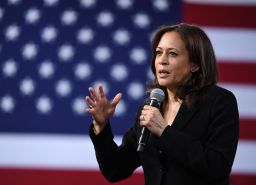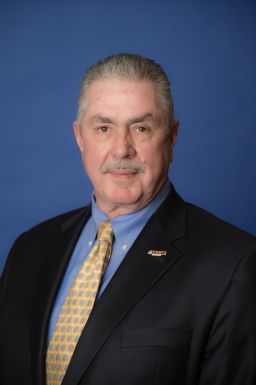Editor’s Note: Kamala Harris is a US Senator for California. Marc Perrone is the President of the United Food and Commercial Workers (UFCW) International Union, which represents 1.3 million workers in grocery stores, meatpacking plants, and other essential businesses on the frontlines of the Covid-19 pandemic. The opinions expressed in this commentary are their own. View more opinion at CNN.
Our country is hurting. People are losing their jobs, parents are struggling to keep a roof over their kids’ heads and Americans are getting sick and dying in record numbers. The pain and suffering is often too much to bear. As this crisis continues, we must remember all of the frontline workers who are continuing to put themselves in harm’s way to help others make it through these challenging times.


Since the beginning of the Covid-19 pandemic, millions of America’s grocery workers have continued to report to work and serve their communities, despite the ongoing hazards and danger of being exposed to the novel coronavirus.
The brave, dedicated workers who put themselves at risk when they enter their workplaces don’t make headlines, but each of us should value their quiet courage and sacrifice every time we visit our neighborhood grocery store. We cannot take their work or safety for granted – and their employers shouldn’t either. But too many grocery chain CEOs treat their workers as expendable. This is unacceptable.
Grocery workers are essential workers – without them, families across the country would not have access to the food they need during this pandemic. Given the increasing dangers as Covid-19 continues to spread, the time is now to reinstate hazard pay for all of America’s grocery workers.
The health threat that these workers face cannot be overstated. According to the Washington Post, by late May, more than 100 grocery workers had already died and at least an additional 5,500 grocery workers had tested positive for Covid-19. That number is likely higher, but a lack of transparency from grocery stores about how many workers have become sick or exposed during this pandemic has made the number difficult to estimate.
As we all know, this pandemic is far from over and the health threats that grocery workers face are just as real now as they were when this crisis began. As one grocery deli manager put it, employees are working in conditions they have “never seen before.” Not only are workers interacting with customers, they are wearing masks and social distancing, all while constantly wiping down cash registers, food conveyor belts and shopping carts. These workers are also continuously working to restock items that households desperately need like toilet paper, cleaning supplies and other essentials.
Given the nature of these jobs, grocery workers must be there to help countless customers who are stressed and fearful for their futures. Moreover, they are staying inside with large crowds every day, with ventilation systems that could be spreading the novel coronavirus.
While top grocery chains rake in billions in profits during this pandemic, these frontline workers cannot choose to work from home like the corporate executives of these companies do. The responsibility to properly protect and support store workers lies with these executives, who must make the decision to consistently pay workers a wage that justly compensates them for the clear and present dangers of their jobs during the pandemic.
Yet, many stores do not seem to acknowledge the continued risk these workers face. In fact, many of the largest grocery chains in America – including Kroger, Albertsons, and Amazon-owned Whole Foods – have cut the hazard pay wage they provided to frontline workers at the beginning of this pandemic. While some smaller grocery chains have stepped up to extend hazard pay, many of these top grocery store companies in the industry still refuse to do the right thing.
Whole Foods justified cutting hazard pay for its nearly 100,000 grocery workers by saying the company is “planning for the long term” and “continuing to explore new ways to support” its employees. Kroger defended cutting hazard pay for its 460,000 grocery workers by citing paid emergency leave and other expanded benefits, while a spokesperson said that the needs of employees would “continue to evolve and change as our country recovers.”
But the brutal truth is that our country is miles from “recovery,” and the only thing that has “changed” since these companies cut hazard pay is that even more Americans have been infected by Covid-19, including thousands of grocery workers across the country.
The simple fact is that grocery store workers are putting their lives on the line every day that they walk into the store. They work hard. They work long hours. And they need to support their families just like all of us do.
As the danger of Covid-19 continues, our country’s grocery workers – at both union and non-union supermarkets – continue to be essential to daily life during this pandemic. Without these frontline workers, our families will not have the food we need to get through this public health crisis.
This pandemic has revealed many failures of leadership across American life, but the failure of CEOs to support the hardworking men and women who are keeping their businesses afloat is particularly jarring. Our corporate leaders – especially those who lead America’s largest grocery companies – must take concrete and immediate steps to keep their workers safe and fairly compensate them for the serious health hazards they face. For these brave men and women who continue to be on the frontlines of this crisis, our country should demand nothing less.
Given the seriousness of this pandemic, and the essential jobs they do, the time has come to reinstate hazard pay for all of America’s grocery workers.

